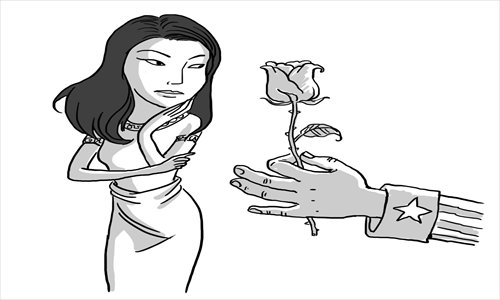US and Myanmar eyeing possible romance

US President Barack Obama paid a visit to Myanmar on November 19, where he met Myanmar President Thein Sein and opposition leader Aung San Suu Kyi. Obama is the first US president to visit Myanmar while in office. Although the visit only lasted six hours, it was of great symbolic significance.
The Myanmar government is seeking to reconstruct its relationship with the Western countries, Obama's visit is the strongest sign of support from the West to the Thein Sein administration so far, and it also "rewards" Myanmar's promotion of democracy.
The Obama administration's policy toward Myanmar emphasizes sanctions plus contact. It has turned away from the previous long-term sanctions and isolation policy, believing that would only push Myanmar closer to its Asian neighbors and cause US enterprises to lose opportunities in Myanmar.
Over the past few years, US politicians have been consistently visiting Myanmar and making contact with high-level officials there.
An improved US-Myanmar relationship will help the US build new influence over ASEAN. The US is seeking to create a pro-US mood among ASEAN members.
This strategy is aimed at Vietnam, Myanmar and Laos, given Singapore, the Philippines and Thailand are already pro-US.
But the US takes very cautious and steady actions in realizing its goal. Even during the Obama visit, no announcement on fully lifting sanctions against Myanmar was made.
The power to eliminate sanctions is in the hands of congress, and Obama cannot unilaterally decide to lift the sanctions. Generally, the US won't easily lift its sanctions against Myanmar unless the country takes a US-influenced democratic track.
Whether and when to fully lift the sanctions is an important tool for the US to use in influencing Myanmar's reforms.
For Myanmar, one of its democratic reform goals is to improve relations with the US and expand diplomatic flexibility.
Myanmar's democratic reform comes at the same time as the US pivot to the Asia-Pacific region, which creates more room for interaction between the two.
Myanmar is being very cautious in promoting democracy and making relevant policies. Against the background of complicated domestic issues, radical change will risk social turbulence.
Meanwhile, Myanmar knows that it cannot satisfy the US demands all at once. Currently, Myanmar demands the US reward it for its democratic measures.
Given that the US urgently needs a strategic point in the Indo-China Peninsula to back its pivot to Asia-Pacific and contain China's rise, the Myanmar government has fully recognized the country's strategic importance and the opportunity to dialogue with the US.
The current interaction between Myanmar and the US is a mutually influenced one.
The speed of Myanmar's reform has astonished the world and resulted in a rapidly diverse political and social ecology in the country. But the reforms at the current stage are merely based on verbal promises of the president and the military. It needs to be tested by time.
The US suspicion about the transparency of the Myanmar government's decision-making, and criticism over the country's lack of protection of human rights and military cooperation with North Korea show that the future democratization of Myanmar is still in question. The US will not miss any chance to exert influence on Myanmar.
For over 20 years, the US has swayed between idealism and realism in its policy against Myanmar.
In other words, it has been weighing whether it should set promoting democracy in Myanmar as the top priority or seek its own geopolitical strategic interests.
Obama's Myanmar visit highlights the selective use of democracy and human rights issues.
Has the US-Myanmar relationship entered into a honeymoon? Is the course ahead for the two smooth? It's too early to say.
Obama tries to win political points by promoting democratization and seeking more friendly countries in the Asia-Pacific, but the US also continues trying to influence Myanmar's domestic issues like human rights and ethnic conflicts.
As a formerly colonized country, Myanmar is averse to external interferences. Whether it will reform as the US expects and satisfy all the US requirements remains to be seen.
The author is a professor of School of International Studies at Yunnan University. opinion@globaltimes.com.cn